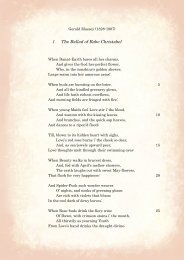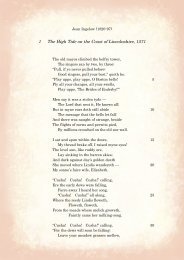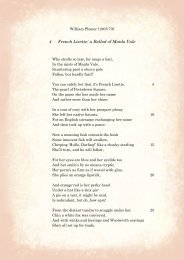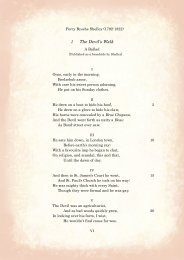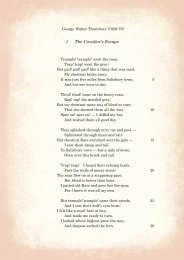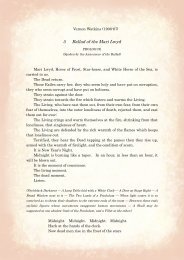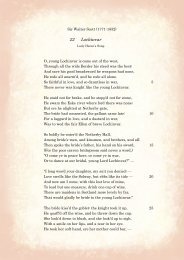14 The Noble Moringer
14 The Noble Moringer
14 The Noble Moringer
You also want an ePaper? Increase the reach of your titles
YUMPU automatically turns print PDFs into web optimized ePapers that Google loves.
Sir Walter Scott (1771-1832)<br />
<strong>14</strong> <strong>The</strong> <strong>Noble</strong> <strong>Moringer</strong><br />
An Ancient Ballad.<br />
Translated from the German.<br />
<strong>The</strong> original of these verses occurs in a collection of German popular songs, entitled,<br />
Sammlung Deutschen Volkslieder, Berlin, 1807, published by Messrs. Busching and Von<br />
der Hagen, both, and more especially the last, distinguished for their acquaintance with the<br />
ancient popular poetry and legendary history of Germany.<br />
In the German Editor’s notice of the ballad, it is stated to have been extracted from a<br />
manuscript Chronicle of Nicolaus Thomann, chaplain to Saint Leonard in Weisenhorn,<br />
which bears the date 1533; and the song is stated by the author to have been generally<br />
sung in the neighbourhood at that early period. Thomann, as quoted by the German<br />
Editor, seems faithfully to have believed the event he narrates. He quotes tombstones and<br />
obituaries to prove the existence of the personages of the ballad, and discovers that there<br />
actually died, on the 11th May 1349, a Lady Von Neuffen, Countess of Marstetten, who was,<br />
by birth, of the house of <strong>Moringer</strong>. This lady he supposes to have been <strong>Moringer</strong>’s<br />
daughter, mentioned in the ballad. He quotes the same authority for the death of<br />
Berckhold Von Neuffen, in the same year. <strong>The</strong> editors, on the whole, seem to embrace the<br />
opinion of Professor Smith of Ulm, who, from the language of the ballad, ascribes its date to<br />
the 15th century.<br />
<strong>The</strong> legend itself turns on an incident not peculiar to Germany, and which, perhaps, was<br />
not unlikely to happen in more instances than one, when crusaders abode long in the Holy<br />
Land, and their disconsolate dames received no tidings of their fate. A story, very similar<br />
in circumstances, but without the miraculous machinery of Saint Thomas, is told of one of<br />
the ancient Lords of Haigh-hall in Lancashire, the patrimonial inheritance of the late<br />
Countess of Balcarras; and the particulars are represented on stained glass upon a window<br />
in that ancient manor-house.<br />
O, will you hear a knightly tale of old Bohemian day,<br />
It was the noble <strong>Moringer</strong> in wedlock bed he lay;<br />
He halsed and kiss’d his dearest dame, that was as sweet as May,<br />
And said, “Now, lady of my heart, attend the words I say.<br />
I.
II.<br />
“’Tis I have vow’d a pilgrimage unto a distant shrine, 5<br />
And I must seek Saint Thomas-land, and leave the land that’s mine;<br />
Here shalt thou dwell the while in state, so thou wilt pledge thy fay,<br />
That thou for my return wilt wait seven twelvemonths and a day.”<br />
<strong>The</strong>n out and spoke that Lady bright, sore troubled in her cheer,<br />
III.<br />
“Now tell me true, thou noble knight, what order takest thou here; 10<br />
And who shall lead thy vassal band, and hold thy lordly sway,<br />
And be thy lady’s guardian true when thou art far away?”<br />
Out spoke the noble <strong>Moringer</strong>, “Of that have thou no care,<br />
<strong>The</strong>re’s many a valiant gentleman of me holds living fair;<br />
IV.<br />
<strong>The</strong> trustiest shall rule my land, my vassals and my state, 15<br />
And be a guardian tried and true to thee, my lovely mate.<br />
“As Christian-man, I needs must keep the vow which I have plight,<br />
When I am far in foreign land, remember thy true knight;<br />
And cease, my dearest dame, to grieve, for vain were sorrow now,<br />
But grant thy <strong>Moringer</strong> his leave, since God hath heard his vow.” 20<br />
It was the noble <strong>Moringer</strong> from bed he made him boune,<br />
And met him there his Chamberlain, with ewer and with gown:<br />
He flung the mantle on his back, ’twas furr’d with miniver,<br />
He dipp’d his hand in water cold, and bathed his forehead fair.<br />
V.<br />
VI.<br />
VII.<br />
“Now hear,” he said, “Sir Chamberlain, true vassal art thou mine, 25<br />
And such the trust that I repose in that proved worth of thine,<br />
For seven years shalt thou rule my towers, and lead my vassal train,<br />
And pledge thee for my Lady’s faith till I return again.”
VIII.<br />
<strong>The</strong> Chamberlain was blunt and true, and sturdily said he,<br />
“Abide, my lord, and rule your own, and take this rede from me; 30<br />
That woman’s faith ’s a brittle trust — Seven twelvemonths didst<br />
thou say?<br />
I’ll pledge me for no lady’s truth beyond the seventh fair day.”<br />
<strong>The</strong> noble Baron turn’d him round, his heart was full of care,<br />
His gallant Esquire stood him nigh, he was Marstetten’s heir,<br />
IX.<br />
To whom he spoke right anxiously, “Thou trusty squire to me, 35<br />
Wilt thou receive this weighty trust when I am o’er the sea?<br />
“To watch and ward my castle strong, and to protect my land,<br />
And to the hunting or the host to lead my vassal band;<br />
And pledge thee for my Lady’s faith till seven long years are gone,<br />
And guard her as Our Lady dear was guarded by Saint John.” 40<br />
Marstetten’s heir was kind and true, but fiery, hot, and young,<br />
And readily he answer made with too presumptuous tongue;<br />
“My noble lord, cast care away, and on your journey wend,<br />
And trust this charge to me until your pilgrimage have end.<br />
X.<br />
XI.<br />
XII.<br />
“Rely upon my plighted faith, which shall be truly tried, 45<br />
To guard your lands, and ward your towers, and with your vassals ride;<br />
And for your lovely Lady’s faith, so virtuous and so dear,<br />
I’ll gage my head it knows no change, be absent thirty year.”<br />
XIII.<br />
<strong>The</strong> noble <strong>Moringer</strong> took cheer when thus he heard him speak,<br />
And doubt forsook his troubled brow, and sorrow left his cheek; 50<br />
A long adieu he bids to all — hoists topsails, and away,<br />
And wanders in Saint Thomas-land seven twelvemonths and a day.
XIV.<br />
It was the noble <strong>Moringer</strong> within an orchard slept,<br />
When on the Baron’s slumbering sense a boding vision crept;<br />
And whisper’d in his ear a voice, “’Tis time, Sir Knight, to wake, 55<br />
Thy lady and thy heritage another master take.<br />
XV.<br />
“Thy tower another banner knows, thy steeds another rein,<br />
And stoop them to another’s will thy gallant vassal train;<br />
And she, the Lady of thy love, so faithful once and fair,<br />
This night within thy fathers’ hall she weds Marstetten’s heir.” 60<br />
XVI.<br />
It is the noble <strong>Moringer</strong> starts up and tears his beard,<br />
“Oh would that I had ne’er been born! what tidings have I heard!<br />
To lose my lordship and my lands the less would be my care,<br />
But, God! that e’er a squire untrue should wed my Lady fair.<br />
XVII.<br />
“O good Saint Thomas, hear,” he pray’d, “my patron Saint art thou, 65<br />
A traitor robs me of my land even while I pay my vow!<br />
My wife he brings to infamy that was so pure of name,<br />
And I am far in foreign land, and must endure the shame.”<br />
XVIII.<br />
It was the good Saint Thomas, then, who heard his pilgrim’s prayer,<br />
And sent a sleep so deep and dead that it o’erpower’d his care; 70<br />
He waked in fair Bohemian land outstretch’d beside a rill,<br />
High on the right a castle stood, low on the left a mill.<br />
XIX.<br />
<strong>The</strong> <strong>Moringer</strong> he started up as one from spell unbound,<br />
And dizzy with surprise and joy gazed wildly all around;<br />
“I know my fathers’ ancient towers, the mill, the stream I know, 75<br />
Now blessed be my patron Saint who cheer’d his pilgrim’s woe!”<br />
XX.
He leant upon his pilgrim staff, and to the mill he drew,<br />
So alter’d was his goodly form that none their master knew;<br />
<strong>The</strong> Baron to the miller said, “Good friend, for charity,<br />
Tell a poor palmer in your land what tidings may there be?” 80<br />
XXI.<br />
<strong>The</strong> miller answered him again, “He knew of little news,<br />
Save that the Lady of the land did a new bridegroom choose;<br />
Her husband died in distant land, such is the constant word,<br />
His death sits heavy on our souls, he was a worthy Lord.<br />
XXII.<br />
“Of him I held the little mill which wins me living free, 85<br />
God rest the Baron in his grave, he still was kind to me!<br />
And when Saint Martin’s tide comes round, and millers take their toll,<br />
<strong>The</strong> priest that prays for <strong>Moringer</strong> shall have both cope and stole.”<br />
XXIII.<br />
It was the noble <strong>Moringer</strong> to climb the hill began,<br />
And stood before the bolted gate a woe and weary man; 90<br />
“Now help me, every saint in heaven that can compassion take,<br />
To gain the entrance of my hall this woful match to break.”<br />
XXIV.<br />
His very knock it sounded sad, his call was sad and slow,<br />
For heart and head, and voice and hand, were heavy all with woe;<br />
And to the warder thus he spoke; “Friend, to thy Lady say, 95<br />
A pilgrim from Saint Thomas-land craves harbour for a day.<br />
XXV.<br />
“I’ve wander’d many a weary step, my strength is wellnigh done,<br />
And if she turn me from her gate I’ll see no morrow’s sun;<br />
I pray, for sweet Saint Thomas’ sake, a pilgrim’s bed and dole,<br />
And for the sake of <strong>Moringer</strong>’s, her once-loved husband’s soul.” 100<br />
XXVI.<br />
It was the stalwart warder then he came his dame before,
“A pilgrim, worn and travel-toil’d, stands at the castle-door;<br />
And prays, for sweet Saint Thomas’ sake, for harbour and for dole,<br />
And for the sake of <strong>Moringer</strong>, thy noble husband’s soul.”<br />
XXVII.<br />
<strong>The</strong> Lady’s gentle heart was moved, “Do up the gate,” she said, 105<br />
“And bid the wanderer welcome be to banquet and to bed;<br />
And since he names my husband’s name, so that he lists to stay,<br />
<strong>The</strong>se towers shall be his harbourage a twelvemonth and a day.”<br />
XXVIII.<br />
It was the stalwart warder then undid the portal broad,<br />
It was the noble <strong>Moringer</strong> that o’er the threshold strode; 110<br />
“And have thou thanks, kind heaven,” he said, “though from a man of sin,<br />
That the true lord stands here once more his castle-gate within.”<br />
XXIX.<br />
<strong>The</strong>n up the halls paced <strong>Moringer</strong>, his step was sad and slow;<br />
It sat full heavy on his heart, none seem’d their Lord to know;<br />
He sat him on a lowly bench, oppress’d with woe and wrong, 115<br />
Short space he sat, but ne’er to him seem’d little space so long.<br />
XXX.<br />
Now spent was day, and feasting o’er, and come was evening hour,<br />
<strong>The</strong> time was nigh when new-made brides retire to nuptial bower;<br />
“Our castle’s wont,” a brides-man said, “hath been both firm and long,<br />
No guest to harbour in our halls till he shall chant a song.” 120<br />
XXXI.<br />
<strong>The</strong>n spoke the youthful bridegroom there as he sat by the bride,<br />
“My merry minstrel folk,” quoth he, “lay shalm and harp aside;<br />
Our pilgrim guest must sing a lay, the castle’s rule to hold,<br />
And well his guerdon will I pay with garment and with gold.” —<br />
XXXII.<br />
“Chill flows the lay of frozen age,” ’twas thus the pilgrim sung, 125<br />
“Nor golden meed nor garment gay, unlocks his heavy tongue;
Once did I sit, thou bridegroom gay, at board as rich as thine,<br />
And by my side as fair a bride with all her charms was mine.<br />
XXXIII.<br />
“But time traced furrows on my face, and I grew silver-hair’d,<br />
For locks of brown, and cheeks of youth, she left this brow and beard; 130<br />
Once rich, but now a palmer poor, I tread life’s latest stage,<br />
And mingle with your bridal mirth the lay of frozen age.”<br />
XXXIV.<br />
It was the noble Lady there this woful lay that hears,<br />
And for the aged pilgrim’s grief her eye was dimm’d with tears;<br />
She bade her gallant cupbearer a golden beaker take, 135<br />
And bear it to the palmer poor to quaff it for her sake.<br />
XXXV.<br />
It was the noble <strong>Moringer</strong> that dropp’d amid the wine<br />
A bridal ring of burning gold so costly and so fine:<br />
Now listen, gentles, to my song, it tells you but the sooth,<br />
’Twas with that very ring of gold he pledged his bridal truth. <strong>14</strong>0<br />
XXXVI.<br />
<strong>The</strong>n to the cupbearer he said, “Do me one kindly deed,<br />
And should my better days return, full rich shall be thy meed;<br />
Bear back the golden cup again to yonder bride so gay,<br />
And crave her of her courtesy to pledge the palmer grey.”<br />
XXXVII.<br />
<strong>The</strong> cupbearer was courtly bred, nor was the boon denied, <strong>14</strong>5<br />
<strong>The</strong> golden cup he took again, and bore it to the bride;<br />
“Lady,” he said, “your reverend guest sends this, and bids me pray,<br />
That, in thy noble courtesy, thou pledge the palmer grey.”<br />
XXXVIII.<br />
<strong>The</strong> ring hath caught the Lady’s eye, she views it close and near,<br />
<strong>The</strong>n might you hear her shriek aloud, “<strong>The</strong> <strong>Moringer</strong> is here!” 150<br />
<strong>The</strong>n might you see her start from seat, while tears in torrents fell,
But whether ’twas for joy or woe, the ladies best can tell.<br />
XXXIX.<br />
But loud she utter’d thanks to Heaven, and every saintly power,<br />
That had return’d the <strong>Moringer</strong> before the midnight hour;<br />
And loud she utter’d vow on vow, that never was there bride, 155<br />
That had like her preserved her troth, or been so sorely tried.<br />
“Yes, here I claim the praise,” she said, “to constant matrons due,<br />
Who keep the troth that they have plight, so stedfastly and true;<br />
XL.<br />
For count the term howe’er you will, so that you count aright,<br />
Seven twelve-months and a day are out when bells toll twelve<br />
to-night.” 160<br />
XLI.<br />
It was Marstetten then rose up, his falchion there he drew,<br />
He kneel’d before the <strong>Moringer</strong>, and down his weapon threw;<br />
“My oath and knightly faith are broke,” these were the words he said,<br />
“<strong>The</strong>n take, my liege, thy vassal’s sword, and take thy vassal’s head.”<br />
XLII.<br />
<strong>The</strong> noble <strong>Moringer</strong> he smiled, and then aloud did say, 165<br />
“He gathers wisdom that hath roam’d seven twelvemonths and a day;<br />
My daughter now hath fifteen years, fame speaks her sweet and fair,<br />
I give her for the bride you lose, and name her for my heir.<br />
XLIII.<br />
“<strong>The</strong> young bridegroom hath youthful bride, the old bridegroom the old,<br />
Whose faith was kept till term and tide so punctually were told; 170<br />
But blessings on the warder kind that oped my castle gate,<br />
For had I come at morrow tide, I came a day too late.”<br />
1819<br />
(From <strong>The</strong> Poetical Works of Sir Walter Scott. Ed. J. G. Lockhart.<br />
Edinburgh: Robert Cadell, 1841)



